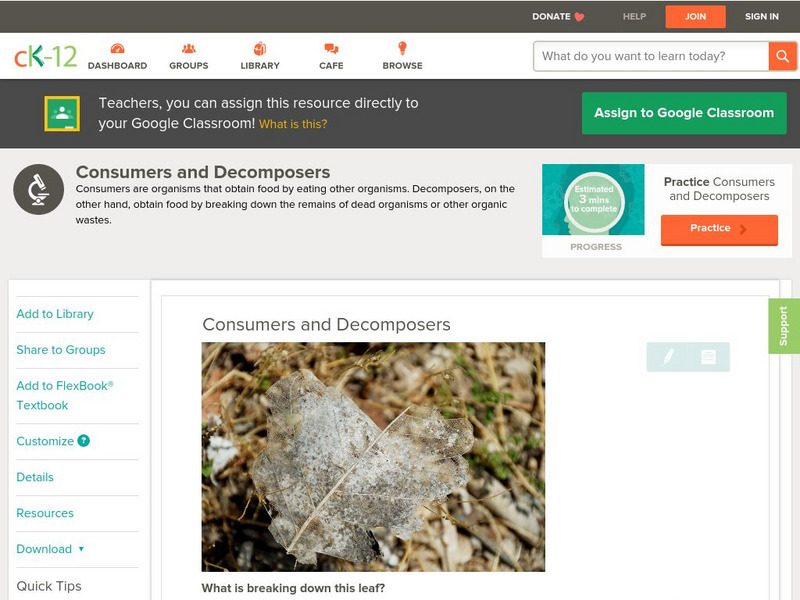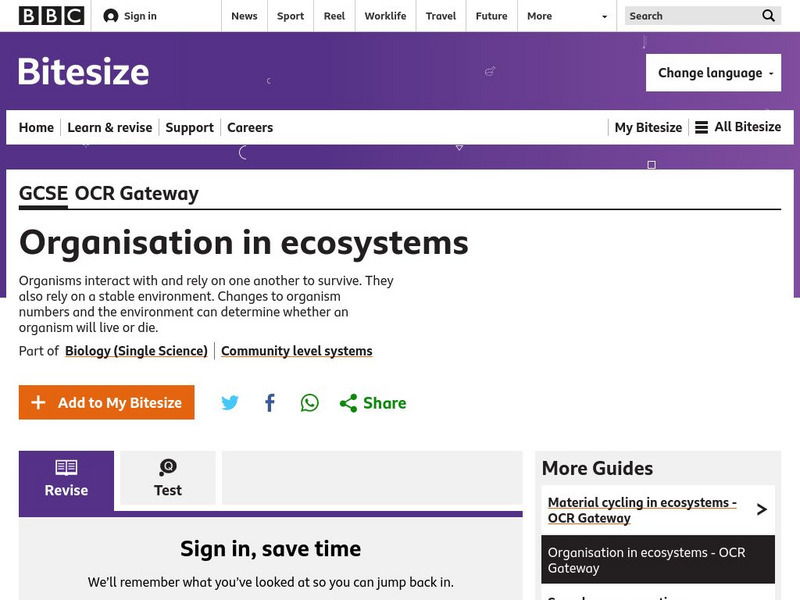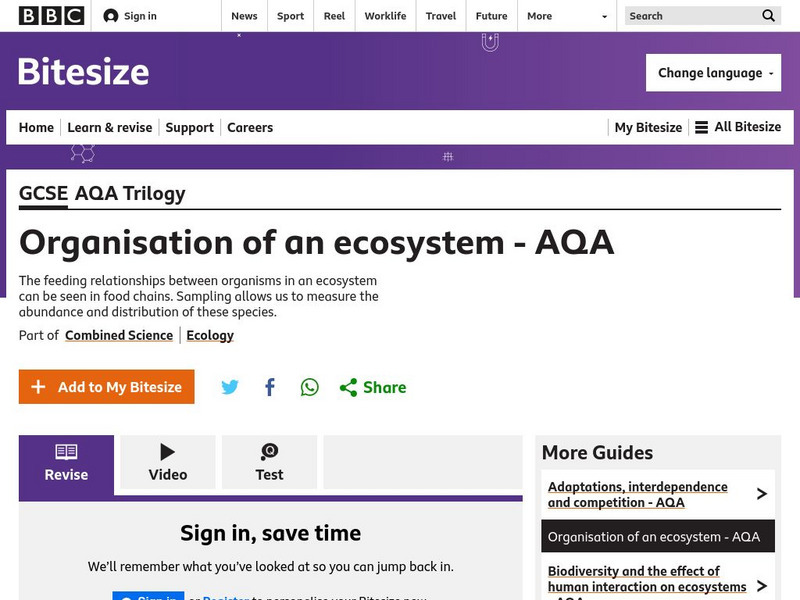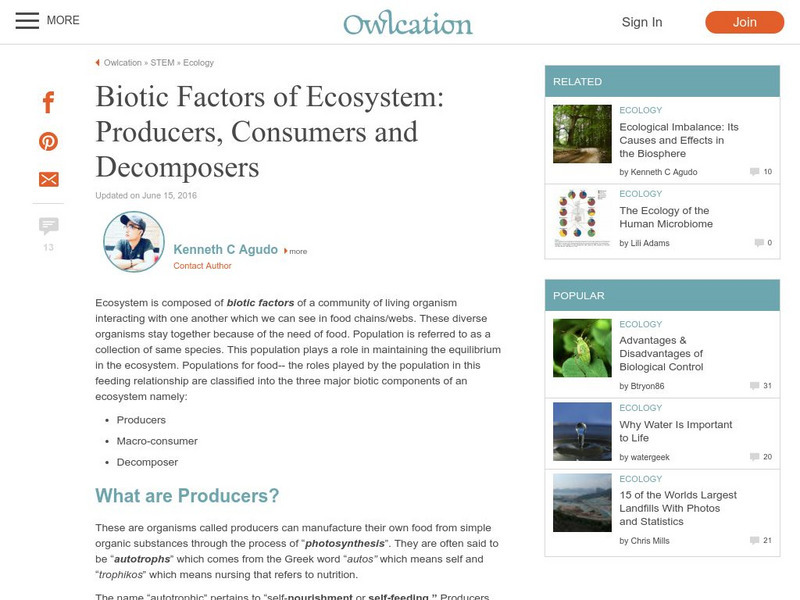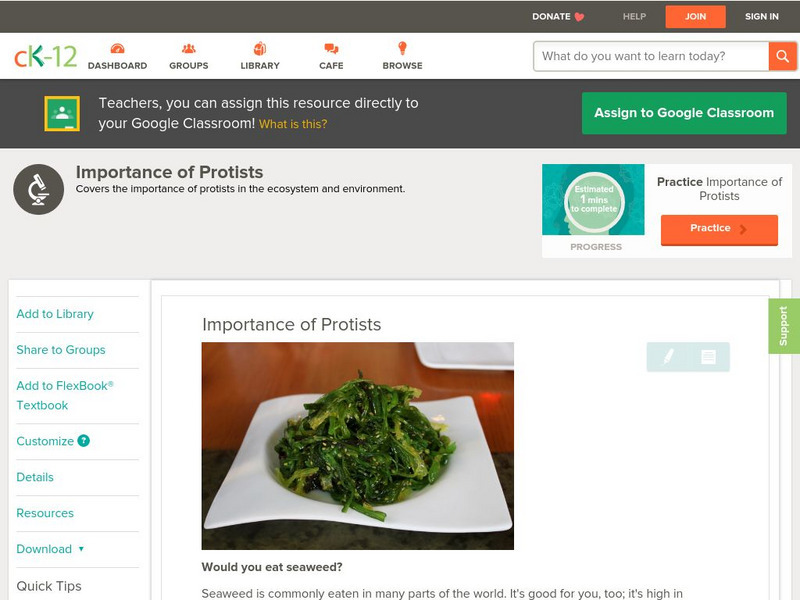Other
My Science Box: Food Chains
Students will use a card sorting activity to construct a food chain and identify the role of organisms within that chain. The cards represent different individuals in an ecosystem and will help students begin to understand the concepts...
Ducksters
Ducksters: Science for Kids: Food Chain and Web
Kids learn about the food chain and food web. How energy cycles and transfers through living organisms.
CK-12 Foundation
Ck 12: Life Science: Consumers and Decomposers
[Free Registration/Login may be required to access all resource tools.] Producers make their own food through photosynthesis. But many organisms are not producers and cannot make their own food, but must get their energy from other...
BBC
Bbc: Gcse Bitesize: Organization in Ecosystems
This lesson focuses on food chains in ecosystems, including levels of consumers, decomposers, and a list of common words used with food chains and their definitions. It also provides a link to an assessment.
University of Utah
University of Utah: Learning Center: learn.genetics: Great Salt Lake Food Web
Visualize how energy transfer takes place in two linked food chains, and how it demonstrates the interdependence organisms of the Great Salt Lake.
CK-12 Foundation
Ck 12: Fifth Grade Science: Life Science: The Flow of Energy in an Ecosystem
A module that explains what an ecosystem is and how energy and matter move through them. Students will look at the different roles of plants and animals and at ecological relationships in food chains and food webs.
BBC
Bbc: Gcse Bitesize: Organization of an Ecosystem Aqa
This lesson focuses on the organization of an ecosystem. The feeding relationships between organisms in an ecosystem can be seen in food chains. Sampling allows us to measure the abundance and distribution of these species. It provides...
CK-12 Foundation
Ck 12: Episd: Consumers and Decomposers
[Free Registration/Login may be required to access all resource tools.] Based upon the way organisms acquire their energy students will understand how to group them as consumers, decomposers or producers.
TeachEngineering
Teach Engineering: Got Energy? Spinning a Food Web
Students learn about energy flow in food webs, including the roles of the sun, producers, consumers and decomposers in the energy cycle. They model a food web and create diagrams of food webs using their own drawings and/or images from...
Science Struck
Science Struck: Decomposers in the Ocean: Role and Examples
Describes five different types of decomposers that feed on decaying organic matter in the oceans and that are at the bottom of the ocean food chain.
Science Struck
Science Struck: Rainforest Food Web
Explains the characteristics of tropical and temperate rainforests and what rainforest food webs look like.
TeachEngineering
Teach Engineering: Go With the Energy Flow
Students learn about energy and nutrient flow in various biosphere climates and environments. They learn about herbivores, carnivores, omnivores, food chains and food webs, seeing the interdependence between producers, consumers and...
Other
Hub Pages: Biotic Factors of Ecosystem: Producers, Consumers and Decomposers
An ecosystem is composed of biotic factors of a community of living organisms interacting with one another which we can see in food chains/webs. These diverse organisms stay together because of the need of food. Population is referred to...
SMART Technologies
Smart: Energy Flow in an Ecosystem
Students learn about Abiotic and Biotic Factors and how they affect the ecosystem in which an animal might live in.
TeachEngineering
Teach Engineering: Biodomes
Students explore the biosphere's environments and ecosystems, learning along the way about the plants, animals, resources and natural cycles of our planet. Over the course of lessons 2-6, students use their growing understanding of...
Other
S Cool: Engery Flow and Nutrient Cycle
This website describes trophic levels, transfer of energy between trophic levels, pyramids of ecology, and nutrient cycles within the environment.
E-learning for Kids
E Learning for Kids: Science: South Africa: How Do Organisms Get Their Energy?
Join Ellen on her trip to the Kaap De Goede Hoop in South Africa, and learn more about plants, animals, and energy.
Soft Schools
Soft Schools: Ecology Quiz
Take this interactive, multiple-choice quiz over concepts in ecology, then review your score and any missed questions at the end.
CK-12 Foundation
Ck 12: Life Science: Importance of Protists
[Free Registration/Login may be required to access all resource tools.] Humans could not live on Earth if it were not for protists. Why? Protists produce almost one-half of the oxygen on the planet, decompose and recycle nutrients that...




